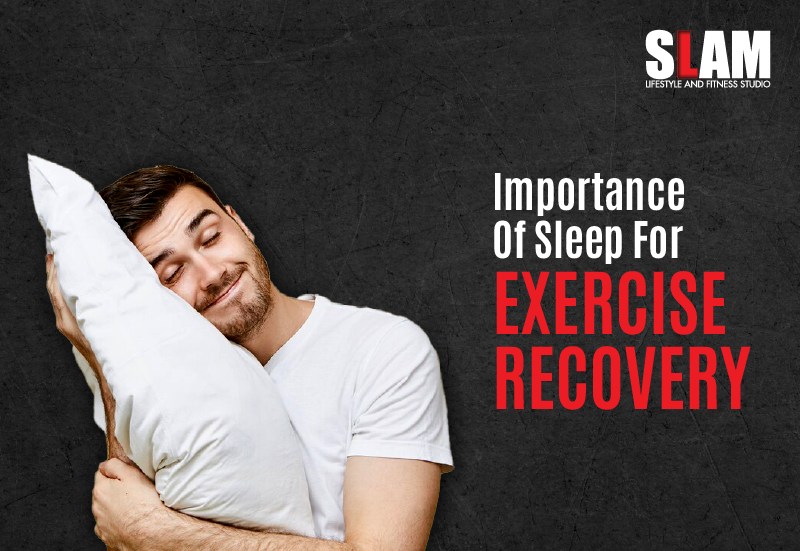Introduction
Uncovering the secrets of the night, we explore the nine critical aspects of sleep for exercise recovery that go beyond simple relaxation to serve as a foundation for overall health and fitness. Every aspect of workout recovery, from mental toughness and metabolic control to muscle regeneration and hormonal balance, is crucial.
Come along on this eye-opening adventure as we uncover the deep effects of sleep’s transforming power on your fitness activities, guaranteeing that every workout, run, and recovery is a step toward optimal performance and total well-being.
1. Muscle Repair and Growth – sleep for exercise recovery

The body releases growth hormone during deep sleep, which is vital for post-exercise muscle growth and repair. This hormone promotes protein synthesis and tissue regeneration, aiding in the healing of microtears sustained during strenuous exercise.
The pituitary gland releases more growth hormone during deep sleep cycles, which creates the ideal environment for muscle adaption.
This natural process is hampered by insufficient deep sleep, which may reduce exercise efficiency and impede general fitness development. It becomes essential for people who want to enhance muscle regeneration and make significant increases in strength and endurance to prioritise getting enough good sleep.
2. Energy Restoration
Good sleep is an essential energy-repair mechanism that has a direct effect on how well you function when you exercise later. The body makes cellular repair and energy conservation the first priority when you’re in deep sleep.
Resting enough enables muscles to restock on glycogen, which guarantees an energy supply that is always available. In addition, the sleep-wake cycle affects neurotransmitter balance, which helps athletes focus and coordinate better.
Encouraging ideal physiological circumstances through sleep is crucial for maintaining energy levels, which in turn allows people to perform at their best and approach workouts with zeal. Developing a regular sleep schedule that is both sufficient and consistent is essential for anyone looking to maximise their workouts and overall fitness results.
3. Hormonal Balance

After exercise, sleep is essential for preserving the balance of hormones, especially cortisol and testosterone. The delicate balance between these hormones is upset by sleep deprivation, which results in higher levels of the stress hormone cortisol and lower levels of testosterone, which is essential for muscle growth and repair.
A good night’s sleep functions as a natural stress reliever, lowering cortisol levels and facilitating the body’s shift into an anabolic state where testosterone effectively promotes muscle rebuilding. In addition to supporting physical recuperation, a well-rounded hormonal profile—which is influenced by getting enough sleep—also contributes to a healthier body and maximises exercise results.
4. Immune System Support
Getting enough sleep is essential for immune system support and for the healing process after exercise. The body creates and releases cytokines, which are vital proteins for healing and the immune system, as you sleep. Lack of sleep impairs immunity, leaving people more prone to illnesses that can impede their progress toward fitness.
Making getting enough good sleep a priority strengthens the immune system, lowers the risk of infection, and improves general health in a proactive manner. The body is resilient and prepared for the physical demands of regular exercise when it has a strong immune system.
5. Inflammation Reduction
The body starts mechanisms that control inflammatory reactions as you sleep, which aids in tissue repair and healing. This equilibrium is upset by sleep deprivation, which causes increased inflammation and can impede healing and raise the risk of injury.
When people prioritise getting enough sleep, their bodies are better able to control inflammation, which leads to faster recovery from intense exercise. This decrease in inflammation reduces the chance of exercise-related injuries while simultaneously promoting faster recovery and long-term athletic durability.
6. Mental Recovery

The brain processes emotions during restorative sleep, which lowers stress and stabilises mood. Getting enough sleep builds mental toughness, which makes it easier to handle obstacles and disappointments along the way to fitness. It controls neurotransmitters, which affects cognitive and emotional health.
Lack of sleep can lead to increased stress and mood changes, which can negatively impact an individual’s mental health. Making sleep a priority becomes essential for maintaining an optimistic outlook, encouraging emotional equilibrium, and strengthening mental toughness. A relaxed mind is more capable of handling the demands of physical activity, guaranteeing a comprehensive strategy for total well-being.
7. Memory Consolidation
Sleep and memory consolidation have a critical relationship, particularly when it comes to learning and developing new skills for activities. The brain organises and interprets information learned while awake, improving learning new skills and memory retention. Particularly during Rapid Eye Movement (REM) sleep, exercise-related procedural memories and motor skills are solidified.
Getting enough sleep is crucial to maximising the learning curve in physical activities. This means that the benefits of training are retained in the memory long after the workout, which promotes long-term skill development and competency in a variety of exercises.
8. Optimising Performance
Getting enough sleep is essential for maximising both post-exercise recovery and overall athletic performance. Good sleep improves cognitive performance dramatically, improving concentration, judgment, and problem-solving abilities. Improved reaction time, which is important in sports and fitness activities, is another benefit.
The brain consolidates knowledge and honed motor abilities when we sleep, which has a direct impact on exercise proficiency. Restful sleep lowers the chance of injury, promotes mental clarity, and helps the body heal, all of which are critical for optimal athletic performance. Achieving peak performance and maintaining fitness success requires making sleep a priority as a basic component of training plans.
9. Regulation of Metabolism
Ghrelin and leptin, the hunger hormones, are out of balance when we don’t get enough sleep, which might cause us to eat more and possibly gain weight. Furthermore, a lack of sleep influences insulin sensitivity, which impacts the body’s capacity to control blood sugar. These metabolic abnormalities might impede recuperation and jeopardise fitness objectives.
Getting enough sleep is important for maintaining a healthy metabolism, which helps with hunger control and ideal weight management. People may approach recuperation holistically and make sure that sleep-related metabolic disturbances do not jeopardise their fitness path by realising the significant influence of sleep on metabolic processes.
SLAM Fitness Studio

In the world of fitness, SLAM Fitness is an outstanding example of individualised well-being, where your physical needs and health goals are not only respected but also carefully taken care of. SLAM Fitness creates custom programs that are suited to your specific demands thanks to a group of knowledgeable trainers who are dedicated to your success.
With a wealth of experience and enthusiasm, their trainers lead you on a transforming fitness journey, making sure each session is tailored to your specific health objectives.
Their programs, which cover everything from strength training to weight control, are geared toward overall well-being. Slam Fitness is more than just a gym; it’s a welcoming community that values your fitness goals and gives you the one-on-one attention and state-of-the-art programming you need to achieve your health objectives.
Takeaway
It is revolutionary to realise the many roles that sleep plays in hormone balance, mental toughness, muscle regeneration, and metabolic control. Sleeping properly every night is an intentional investment in your general health, not merely a vacation.
Accept the benefits of getting enough sleep to enhance your exercises, lower your chance of injury, and reap the rewards of your labour.
Knowing and appreciating the significance of sleep guarantees that your fitness journey is about more than just the work you do when you’re awake—whether you’re an athlete, a fitness enthusiast, or someone starting a healthier lifestyle. It’s about the healing and transformation that happens when you sleep.
FAQs
- Why is it important to sleep after a workout?
Sleep is essential for the best possible recovery after exercise. The body produces growth hormones as you sleep, which help muscles heal and grow. It lowers stress by regulating hormones like cortisol.
Restoring glycogen, strengthening the immune system, and promoting general physical and mental health are all facilitated by getting enough sleep, which also sets the body up for success in subsequent exercises.
- Why is sleep so important in recovery?
Sleep is essential for healing because it restores muscles, balances hormones, and causes the production of growth hormones. It boosts immunity, lowers inflammation, and restores energy reserves. A healthy sleep schedule is essential for general well-being and helps the body recuperate from activity more effectively.
- How is sleep important for exercise?
Sleep is essential for the greatest potential training outcomes. It regulates key hormones linked to mood and energy, accelerates muscular recovery, and releases growth hormones to promote repair.
Getting adequate sleep improves cognitive function and reaction time, which improves overall athletic performance. Prioritising sleep ensures that the body is ready for effective training and long-term fitness growth.
- How does sleep help athletes recover?
Through the release of growth hormone, sleep facilitates muscle development and repair, which helps athletes recover. It lowers inflammation and stress by controlling cortisol levels. Sleep improves immunity, which lowers the chance of getting sick.
Better overall performance is a result of restored energy storage and optimised cognitive function. Athletes need adequate sleep to ensure that their bodies heal quickly and are ready for the next round of training and competition.



